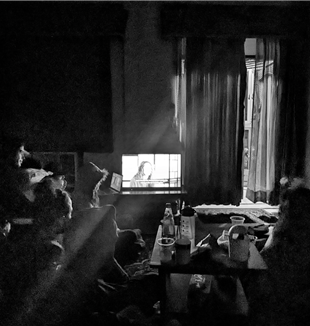
Movies for the Modern Man
Friends in New York are gathering to watch movies, “testing everything and retaining what is good”One evening, a small group of friends watched Fiddler on the Roof: a fascinating movie that deals in a superb way with tradition, about which we were reading in the fourth chapter of The Religious Sense. Suddenly an idea dawned on us: “Why don’t we open this ‘movie night thing’ to the whole community? If we find this work helpful, it must be worth trying to propose it to everyone.”
For our first movie night open to the community, we watched Eternal Sunshine of the Spotless Mind, a film that deals with the practical reductions of the existential questions. Through this movie, we went on a journey with the protagonists, Joel and Clementine, to understand what happens when you try to anesthetize yourself from the drama of life, with all the trauma and the wounds that it may cause. Even if you succeed for a certain amount of time, is imperturbability from the elementary needs of the heart possible? Such are the questions that we try to answer in our discussions after each movie. It is always very interesting to see, through discussion with others, how many things I did not catch from watching the movies that, sometimes, I myself proposed. Just as in School of Community, there is always something that the other’s eye catches that you don’t. Even a slight shift in perspective brings in something new from the other’s gaze. During our movie nights, we try to engage the approach that modern man has towards the questions that most define his nature. As usual, we can only start from different backgrounds. So, as St. Paul said, we’re starting to “test everything; retain what is good” (1 Thessalonians 5:21).
A couple of weeks afterwards, we turned to Lady Bird to help us better understand the first part of Chapter 8 of The Religious Sense, “Breaking With the Past.” Christine McPherson is a teenager from Sacramento, California. Her rebellious nature leads her to refuse her first name and adopt the nickname “Lady Bird”. She desires to escape to New York to realize her aspirations, and is challenged by her affectionate, but not very understanding, parents. She struggles during her senior year at a Catholic high school, feeling as if she is locked up in a cage. This pushes her to rebel even further and reject her origins and the social rules of the Californian suburbs where she lives. She will go on with her rebellion, trying to find her way in life, and at the end she will discover something unexpected.
These chapters of The Religious Sense are challenging, as they describe not only the reductions (our reductions!) but also the consequences of such reductions. We selected The Man Who Wasn’t There, a Coen brothers movie, to flesh out “Consequences of the Unreasonable Positions Before the Ultimate Questions,” especially uncommunicativeness, solitude, and loss of freedom. All these concepts are personified in Ed Crane, who portrays a man so trapped by his life that he wants to scream out. He is not a slick or swift man, and we get the impression that crucial decisions in his life — about his job and marriage — were simply made by default. He has the second chair in a barbershop for two, where he works next to Frank, his talkative brother-in-law. Ed Crane’s sadness, apathy, and the injustice he feels in front of a desire for redemption, will lead him to make perhaps the only decision in all his life. This is one of the most important Coen brothers movies, clearly and powerfully depicting how solitude and despair can lead modern man to consequences in life that we can hardly imagine.
The movie we watched last week was on the theme of our vacation with the New York community: “Freedom is dependence on God.” At the suggestion of a movie aficionado friend, we decided to watch Sound of Metal. It portrays a dramatic life-changing event for the main character, Ruben, a drummer who performs on stage with his singer-girlfriend while touring around the US in their avant-garde metal duo. We follow Ruben’s journey to accept reality in all its unavoidable aspects. On one’s final obedience to such a reality, all freedom and peace depend.
The initial idea of these movie nights was to help each other in deepening the understanding of the religious sense, as it is treated by Luigi Giussani in the first book of his trilogy. Filmmaking is a magnificent form of the art of storytelling, and has a lot to offer in this regard. We usually take some time to have a short discussion after the movie, attempting to understand what is really happening in the movie, and then what idea(s) the movie conveys in connection to our work on The Religious Sense. We also carefully examine the major characters and how we relate to their stories. So far, there have been many good discussions, and this time spent together has been well worth the while trying to discover that what Giussani gave us in The Religious Sense is a precious key that can be used to read every human and existential condition of contemporary man. We want to look at it, examine, and understand it through his alert eyes.
Denis, Brooklyn, NY